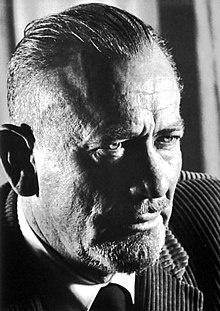1962 Nobel Prize in Literature

The 1962 Nobel Prize in Literature was awarded to the American author John Steinbeck "for his realistic and imaginative writings, combining as they do sympathetic humour and keen social perception."[1]
Laureate[]
Most of John Steinbeck's books deals with social criticism. The novel The Grapes of Wrath, published in 1939, is considered to be his best work.[2]
Nominations and prize decision[]
Steinbeck was nominated for the Nobel Prize in Literature on 11 occasions, the first time in 1943. In 1962 the Nobel committee received two nominations for Steinbeck.[3] In 2012 (50 years later), the Nobel Prize opened its archives and it was revealed that Steinbeck was a "compromise choice" among a shortlist consisting of Steinbeck, British authors Robert Graves and Lawrence Durrell, French dramatist Jean Anouilh and Danish author Karen Blixen.[4] The declassified documents showed that he was chosen as the best of a bad lot:[4] "There aren't any obvious candidates for the Nobel prize and the prize committee is in an unenviable situation," wrote committee member Henry Olsson.[4] Although the committee believed Steinbeck's best work was behind him by 1962, committee member Anders Österling believed the release of his novel The Winter of Our Discontent showed that "after some signs of slowing down in recent years, [Steinbeck has] regained his position as a social truth-teller [and is an] authentic realist fully equal to his predecessors Sinclair Lewis and Ernest Hemingway."[4]
Reactions[]
The selection of Steinbeck was heavily criticized, and described as "one of the Academy's biggest mistakes" in one Swedish newspaper.[4] While there were some positive reactions in America,[5] The New York Times asked why the Nobel committee gave the award to an author whose "limited talent is, in his best books, watered down by tenth-rate philosophising", adding, "we think it interesting that the laurel was not awarded to a writer ... whose significance, influence and sheer body of work had already made a more profound impression on the literature of our age".[4] Steinbeck himself, when asked if he deserved the Nobel on the day of the announcement, replied: "Frankly, no."[4] Today, however, many of Steinbecks works are widely read and considered classics of Western literature.[6]
References[]
- ^ The Nobel Prize in Literature 1962 nobelprize.org
- ^ John Steinbeck nobelprize.org
- ^ John Steinbeck Nominations nobelprize.org
- ^ a b c d e f g Alison Flood (3 January 2013). "Swedish Academy reopens controversy surrounding Steinbeck's Nobel prize". The Guardian. Retrieved 3 January 2013.
- ^ Helmer Lång 100 nobelpris i litteratur Symposion 2001, ISBN 91-7139-537-7 p. 224 (in Swedish)
- ^ "Who, what, why: Why do children study Of Mice and Men?". BBC News. BBC. March 25, 2011. Archived from the original on January 7, 2015. Retrieved December 6, 2014.
External links[]
- Prize presentation nobelprize.org
- The Nobel Prize Award Ceremony 1962 - NobelPrize.org
- Nobel Prize in Literature
- John Steinbeck